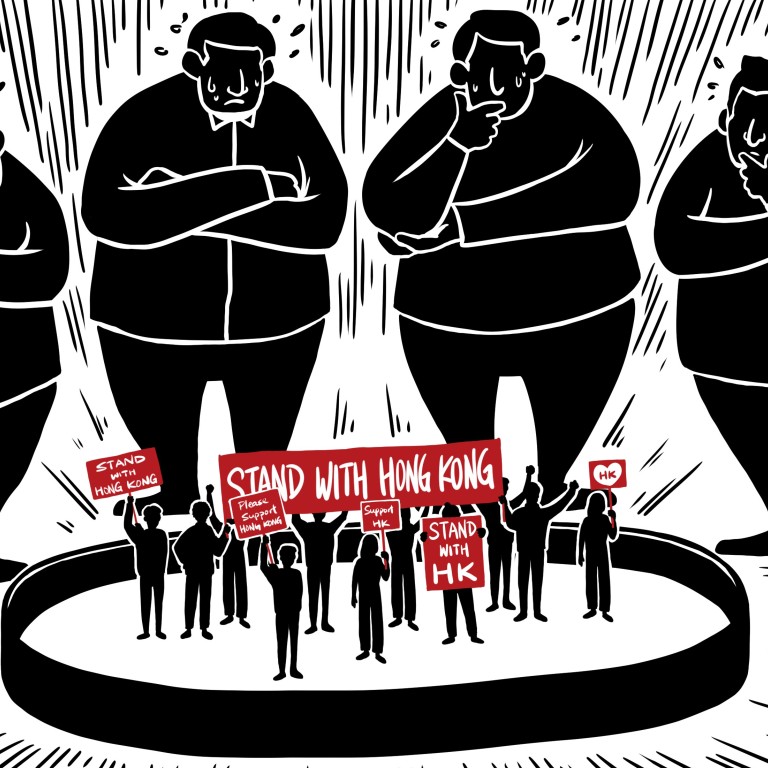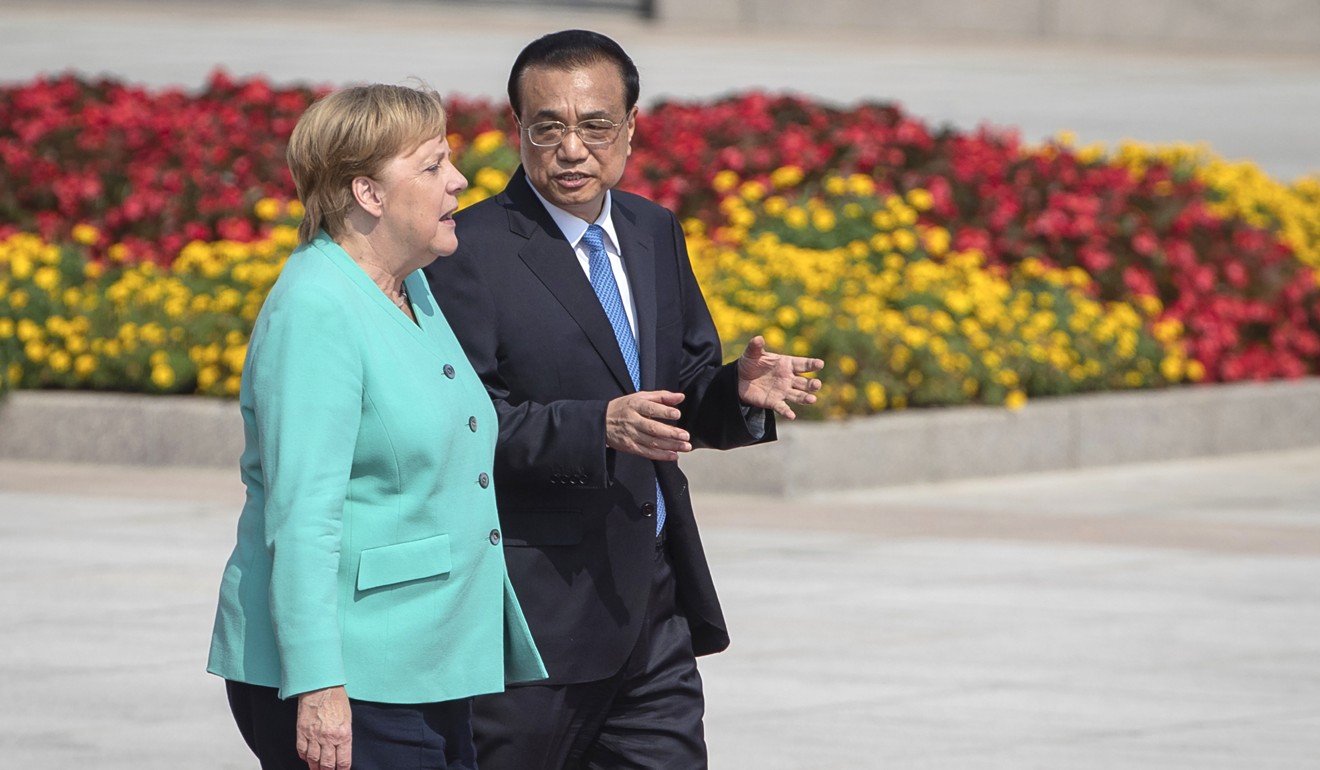
The world watches but will it stand with Hong Kong protesters?
- In a series of in-depth articles on the unrest rocking Hong Kong, the Post goes behind the headlines to look at the underlying issues, current state of affairs and where it is all heading
- Here, we look at the international response to the turmoil and whether it is leading to action
“Stand with Hong Kong, stand with Hong Kong,” the protesters chanted in a sea of American flags.
The protesters want the US Congress to pass the bipartisan bill which would put Hong Kong’s trading privileges from the United States up for annual review. The privileges would rest on whether Hong Kong still qualified as an autonomous area, effectively turning Beijing’s handling of the city into an international issue.
While Beijing maintains that Hong Kong is an internal affair and has warned Western “black hands” against meddling in the crisis, the city’s role as a global financial hub and home to many people from around the world means international interest in the protests is inevitable. But observers said they doubted whether Beijing would buckle under the pressure.
Among the expatriates keen for the bill to pass is MJ Truong, a 31-year-old American product designer who has lived in Hong Kong since 2013.
“I’m in favour of the Hong Kong Human Rights and Democracy Act. I think what it calls for is more than reasonable. It’s not asking for anything above and beyond what was already promised and agreed upon,” Truong said.
Truong is among the 4.6 per cent of Hong Kong’s population who are citizens of other countries, most of whom stayed on the sidelines in June at the start of the then peaceful protests triggered by a now abandoned extradition bill that would have allowed the city to send suspects to jurisdictions including mainland China for trial.
But as the situation deteriorated, many of the expatriates’ home governments have expressed worries about the safety of their nationals. In June, the Thai government even said it had plans to evacuate people if the situation worsened.

“Democrats and Republicans continue to stand united with the people of Hong Kong in demanding the hopeful, free and democratic future that is their right,” Pelosi said.
Last week in Beijing, German Chancellor Angela Merkel became the latest in a long line of Western leaders to speak out about the unrest, calling on the Chinese leadership to reach a “peaceful resolution”.
Sitting next to Merkel, Chinese Premier Li Keqiang stressed that Beijing continued to support Hong Kong to end the violence and chaos. “[Please have confidence that] Chinese people have the capability and wisdom to manage well our own affairs,” Li said.

For Beijing, a big part of the problem is the “disgraceful role” that some foreign governments have played as “black hands” trying to stir a “colour revolution” in the city.
Last month, Hu Xijin, editor-in-chief of the Global Times, said Western governments risked egging on the protesters by speaking up for them and disregarding the repeated pleas by Beijing to stay away from Hong Kong’s affairs.
“The unrest was caused by Hong Kong’s own internal problems. But its nature started to change over time. As with any mass movement, it is emotional in nature and is sustained largely by emotional forces,” Hu said.
Blindsided: why does Beijing keep getting Hong Kong wrong?
“The US and other Western countries have been very vocal in their support and they show no intention of toning it down. The protesters feel encouraged and motivated, they will not reflect on their actions but carry on.”
With the protests now in their 14th week, there are few signs of a quick solution, fuelling debate in Washington about what the United States should do if there is even further escalation.
“It is quite clear that for parts of Washington at least, Hong Kong now figures prominently as a lightning rod for the US-China relationship,” said George Magnus, a research associate at both Oxford University’s China Centre and the SOAS China Institute at the University of London.
Analysts said Washington’s assessment of the city had changed dramatically since the protests.
Hong Kong protests could ‘negatively impact’ suicide rate, expert warns
An annual report by the US State Department in March certified that Hong Kong enjoyed “adequate” autonomy to continue its special treatment as a separate customs entity under the 1992 US-Hong Kong Policy Act.
Now many people “in the United States and elsewhere want to use events in Hong Kong to punish or undermine Beijing”, according to a report jointly authored by Susan Thornton, former US assistant secretary of state for East Asian and Pacific affairs, and Ryan Hass of the Brookings Institution.
The report said that no matter what Washington did, Beijing would complain about American “interference” in Hong Kong’s internal affairs.
“There is no reward to be gained for silence on Hong Kong. But there will be significant and lasting costs if the United States abandons support for peaceful demonstrators,” it said.
For the European Union, China’s biggest trading partner, the focus is on values and “principled engagement” with Beijing.
Mareike Ohlberg, a research associate at the Mercator Institute for China Studies in Berlin, said the EU had paid close attention to the gradual erosion of Hong Kong’s autonomy, especially since the Occupy Central protests in 2014.
“I think the most important thing that European countries can do is to keep monitoring the situation and to signal that they are doing so through public statements,”Ohlberg said.
“One of China’s key goals is to take control of the narrative on Hong Kong and try to obscure what is actually happening. Foreign countries need to challenge Beijing’s line. Not speaking up means silently condoning what is happening and allowing Beijing to take control of the debate.”

Meanwhile, the 10-member Association of Southeast Asian Nations (Asean), which relies heavily on Chinese trade and investment and is deeply divided over how to deal with an increasingly assertive China, has stayed quiet on the unrest in Hong Kong.
A Beijing-based Asean diplomat who declined to be named, said Southeast Asian nations were monitoring the situation in Hong Kong closely because of their trade and investment ties and the large number of citizens from the region in the city.
Yun Sun, a senior fellow and co-director of the East Asia Programme at the Stimson Centre, said the international outcry over Hong Kong was stronger than China thought.
“Countries might be concerned that their economic interests might be jeopardised if they speak publicly against China. But even if they don’t, it doesn’t mean that they are not critical of China for what has happened in Hong Kong,” she said.
Ryo Hinata-Yamaguchi, a visiting professor at Pusan National University in South Korea, said that for now Tokyo was voicing its hopes for stability and prosperity without directly criticising China or officially supporting the protesters.
China blasts German minister who met Hong Kong activist Joshua Wong
“Tokyo is likely to maintain this stance unless the situation gets significantly worse,” Hinata-Yamaguchi said.
Despite extensive trade and cultural ties with the city, there are limits to how much Japan can comment on the situation in Hong Kong.
“Beijing already reacted sharply towards some governments who addressed their concerns about the situation in Hong Kong, so Japan would want to avoid jeopardising its relations with China,” she said.
Despite the international support for the protests, Gal Luft, co-director of the Washington-based Institute for the Analysis of Global Security, warned it would be “hopelessly naive” if Hongkongers believed that the world would stand up to China to protect their freedoms.
“To be sure, there will be a lot of handwringing by the US, [Britain] and others in the West. There may also be some inconsequential sanctions and there are even talks in Washington about reassessment of Hong Kong’s special economic status, but none of those will have much teeth,” Luft said.
“In general, Washington’s approach to democracy and human rights has been cynical and selective. If anything, Washington will use Hong Kong as a bargaining chip in its trade war with China only to abandon it when US objectives are met.”
He said the stakes were high for the protesters.
“To me their gamble is huge. China is not going to relinquish sovereignty over Hong Kong. What is more likely to happen is that international businesses, which until recently viewed Hong Kong as paragon of stability, will no longer view the island as such and will begin to flock to greener pastures. Nothing can harm Hong Kong’s future more than a business exodus. Yet, this is exactly what the protesters are toying with,” he said.
“The people of Hong Kong for their part have made their point and once the economic impact of the protests is felt their domestic legitimacy will quickly dissolve. This is why I believe it won’t take much longer before things calm down,” he said.
As the policymakers and diplomats weigh their options, David Guan, 27, an American student studying in Hong Kong, also said he was worried about the city’s future.
“From a jobs perspective, I am certainly worried about opportunities decreasing, companies being less likely to expand out here or choosing Singapore as a regional headquarters. I do feel that there could be some impact there,” Guan said.
“I’ll graduate next year. I’m a little concerned about how it’s going to shake out – there will still be opportunities, but less so.
“No one knows if this is going to end any time soon ... All that unknown rocks the boat.”
Additional reporting by Simone McCarthy, Keegan Elmer, Laura Zhou and Lee Jeong-ho











